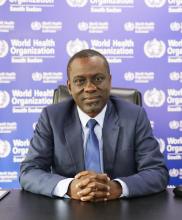UN Day 2025: Building South Sudan’s Health Future Together
Article by Dr Humphrey Karamagi, WHO Representative for South Sudan
As the United Nations marks its 80th anniversary on 24 October under the theme “Building Our Future Together,” South Sudan also stands at a defining moment. This young nation holds immense potential, yet one still carrying the weight of recurring crises. In such moments of uncertainty, health becomes more than a service, it becomes the foundation for peace, resilience, and hope.
World Health Organization, itself turning 77, was born out of the same spirit of unity that created the UN in 1945. From the very beginning, health was recognized as central to human dignity and development. Today, in South Sudan, that conviction drives our mission: saving lives, protecting communities, and securing the nation’s health future.
South Sudan’s Health Journey
Since gaining independence in 2011, South Sudan has faced daunting health challenges. Over 80% of its people live in rural areas with limited access to health facilities. Maternal mortality remains among the highest in the world at 692 deaths per 100 000 live births. Children under five face mortality rates nearly double the global average, and with just 7.6 health workers and 1.4 facilities per 10,000 people, the system is under constant strain.
Yet these statistics tell only part of the story. Alongside these difficulties is a story of resilience, innovation, and progress. In 2023, South Sudan became one of the first countries in Africa to integrate the malaria vaccine into its national immunization programme, offering children a safer start in life. Polio surveillance has reached world-class levels, with stool sample adequacy at 95% and acute flaccid paralysis detection exceeding the global standard. These are not small victories; they are signs that with commitment, progress is possible.
The Triple Burden of Disease
South Sudan faces what we call the “triple burden of disease”:
- Communicable diseases such as malaria, HIV, tuberculosis, neglected tropical diseases and pneumonia remain leading causes of death.
- Noncommunicable diseases like hypertension, diabetes, and cancers are on the rise.
- Injuries, especially road traffic accidents, civil unrest and intercommunal clashes, are affecting the nation’s young, productive population.
Confronting this triple challenge requires not just treatment, but prevention, preparedness, and investment in resilient systems.
WHO’s Contribution: Working Hand in Hand
WHO’s role in South Sudan is not simply to deliver services but to stand alongside the Ministry of Health, communities, and partners in strengthening the foundation of care. Together, we have:
- Strengthened health emergency response through training and rapid deployment of health workers and mobile teams.
- Enhanced community preparedness, particularly for floods and other natural disasters.
- Expanded mental health and psychosocial support, acknowledging that healing minds is as important as healing bodies.
- Disease prevention and control, in successful mass drug and vaccination campaigns, the introduction of the malaria vaccine, strengthened emergency response systems, expanded HIV and TB services, improved laboratory capacity, and enhanced disease surveillance.
- Invested in resilience, ensuring that local health authorities are better equipped to respond to both immediate crises and future threats.
These contributions are part of a broader vision: a South Sudan where every child is immunized, every mother has a safe birth, and every community can withstand the shocks of conflict, floods, or epidemics. These efforts, supported by strong partnerships with international agencies, have contributed to reducing the burden of preventable diseases and building a more resilient health system
Lessons Learned
The COVID-19 pandemic reminded us that no country can face health crises alone. The rapid sharing of data, knowledge, and resources across borders was not optional, it was essential. South Sudan’s experience demonstrated the importance of cross-sector collaboration: government, UN agencies, NGOs, researchers, and communities working together with one goal, saving lives.
We must carry these lessons forward. Building strong surveillance systems, enhancing digital health solutions such as telemedicine and mobile applications, and harnessing tools like geographic information systems for disease mapping are no longer futuristic ideas. They are immediate necessities for effective prevention and response.
Financing Health for the Future
But technology and innovation cannot succeed without sustainable financing. Across Africa, health financing remains fragile, with out-of-pocket spending exceeding 20% in most countries. South Sudan is no exception. Domestic financing for health must increase steadily to ensure long-term sustainability. Evidence shows that public investment in health is the strongest predictor of progress toward universal health coverage. Innovative mechanisms and public–private partnerships will also be vital in bridging gaps.
A Shared Vision for Tomorrow
As we celebrate 80 years of the United Nations, the story of South Sudan illustrates both the challenges and the promise of working together. Every new vaccine introduced, every health worker trained, and every life saved is a reminder that progress is possible even in the most difficult contexts.
Looking ahead, WHO calls for a renewed collective commitment to:
- Strengthen national capacity by training, deploying, and retaining health workers.
- Improve emergency preparedness so that crises do not derail essential health services.
- Expand community-based systems that bring health closer to the people.
- Secure sustainable financing to build a health system that lasts.
Our work is not finished. But the foundations we are building today are preparing South Sudan for a healthier, more resilient future.
On this UN Day, let us reaffirm our shared mission: to ensure health for all, everywhere. For in South Sudan, as across the world, health is not just the absence of disease, it is the bedrock of peace, dignity, and development. Together, we can build that future.
Together, we can ensure that South Sudan’s future is one where no one is left behind, and health is the foundation for peace and prosperity.
Happy UN Day.
Communication Officer
Mobile: +211 921736375
Email: atema [at] who.int (atema[at]who[dot]int)
Communications officer
Emaill: rutaremaraa [at] who.int (rutaremaraa[at]who[dot]int)
